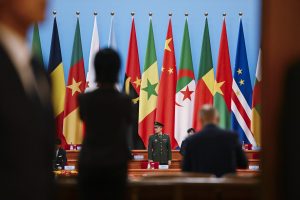The Forum on China-Africa Cooperation (FOCAC) summit was held in Beijing from September 4 to 6. During the summit, Chinese President Xi Jinping told delegates from more than 50 African states that Beijing was ready to step up its cooperation with the African nations in infrastructure, agriculture, industry, investment, and trade.
Xi also committed 360 billion yuan, approximately $51 billion, to financial assistance to African countries over the next three years. It was further specified that about 19.5 percent of the amount would be fresh investment by Chinese firms and 58 percent would be disbursed through credit lines. Moreover, China also committed to provide smaller amounts to individual nations in the continent through different projects, including military aid. It is pertinent to note here that the committed amount is in yuan instead of dollars which signifies Beijing’s push to internationalize its currency.
China’s African bet is part of its greater regional as well as global geoeconomic and geopolitical strategy. However, China’s Africa strategy existed long before FOCAC was established in 2000. As Julia Lovell explained in her book, “Maoism: A Global History,” since the late 1950s, China deployed both soft and hard power to exert its influence over African nations. It was during the Great Leap Forward (1958-1962) that Beijing intensified its actual influence in the continent, with a focus on geoeconomic tools.
Between 1950 and 1978, China granted $24 billion in international financial aid, an important geoeconomic instrument of influence, out of which 13-15 percent was provided to Africa. China made its African bet meticulously even back then to curry favor with nations to seek entry into the United Nations, which turned out to be the primary geopolitical objective behind Beijing’s African strategy. However, China’s objectives in Africa since then have evolved. Today, Beijing seeks to enhance cooperation, mainly under FOCAC and the Belt and Road Initiative (BRI).
China launched the BRI in 2013. Initially, the BRI was seen as a reimagining of the old silk trade routes; thus it was anticipated that Chinese investments in the continent would be limited to the eastern side of Africa. The scope and ambition of the initiative, nevertheless, expanded swiftly, as many other states in Africa sought investment opportunities through the BRI. Between 2013 and 2023, contracts worth $700 billion were signed by Chinese companies in Africa, making it a key BRI region.
Alongside the BRI investments, China has pursued a reliable supply of critical raw materials in Africa. As a result, China is deeply rooted in Africa’s mining industry, and Chinese companies own or have stakes in various cobalt, lithium, and other raw material projects in different African nations. In 2023 alone, Chinese companies invested $7.8 billion in the African mining sector to meet its demand for minerals used in green and high-tech industries, mainly electric vehicles.
Since geoeconomics is a positive-sum game, it is essential that Africa should also benefit from China’s African bet. Despite criticism and skepticism, China seems to be Africa’s last hope, if not its best bet. After centuries of colonialism and decades of neocolonialism by the Western powers, African nations started seeking cooperation from China, which resulted in the establishment of the FOCAC. China has become the largest bilateral trading partner of Africa, reaching a historic high of $282 billion in 2023. Additionally, Beijing is Africa’s main creditor by providing loans and credit worth $170 billion nearly to all 54 states in the continent.
Besides these, under the BRI, China has built several bridges, superhighways, and railways, which enabled states to move away from colonial-era infrastructure and provided job opportunities to thousands of people. According to an estimate, China’s FDI in Africa created some 18,600 jobs annually in Africa between 2010 and 2019, making it the leading investor in terms of job creation. Above all, Beijing’s position in its investments in Africa is different than the Western capitals as it does not interfere in countries’ internal politics and characterizes its funds as mutually beneficial cooperation among developing countries. However, given its economic and political might, China would always have an upper hand in its bilateral relationship with African governments.
Despite a debatable win-win situation, the mutually cooperative relationship between China and Africa is prone to challenges. First, China and Africa both have been facing economic slowdowns, which would impact the trade and investment relationship between the two. Indeed, investment and loans from China to Africa have already slowed down in recent years.
Second, China is accused of “debt trap diplomacy,” which critics say could undermine Africa’s economic stability and progress. The debt trap narrative is largely overblown, but there are other problems with Chinese lending – and regardless of the cause, the African continent is faced with a mounting debt crisis that could make leaders think twice about signing new loans. These challenges along with the growing China-U.S. rift and the resultant U.S. efforts to counter China’s influence, could impact relations between China and Africa.
Regardless of these challenges, both China and Africa pronounced great support for each other at the FOCAC summit last week. During the press conference, the co-chairs of FOCAC – China’s Foreign Minister Wang Yi, Senegal’s Foreign Minister Yassine Fall, and Republic of the Congo’s Foreign Minister Jean-Claude Gakosso – said the summit exhibited the Global South’s unwavering cooperation and confidence in unity along with conveying a message of joint development of China and Africa. Likewise, there was a great emphasis on “joint,” “‘mutual,” and “together” while announcing the summit, again framing Africa-China cooperation as a positive-sum narrative.
China is clearly benefiting from its African bet. At the same time, the question remains whether China would be a true partner in helping African countries move forward on economic development amid ever-changing geoeconomic and geopolitical circumstances.

































